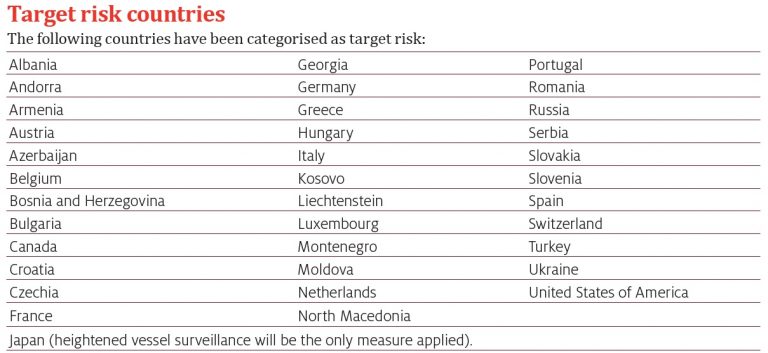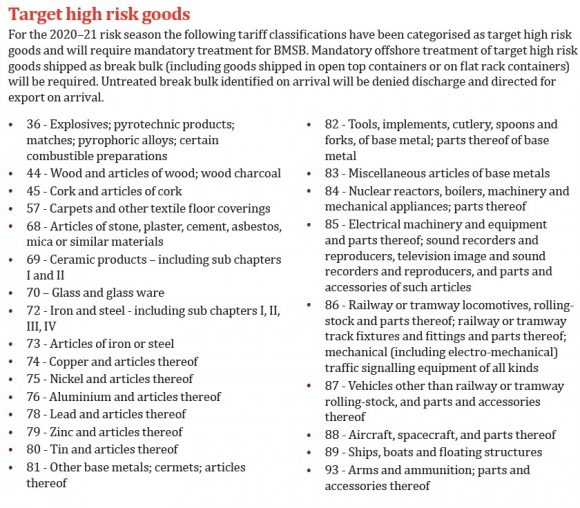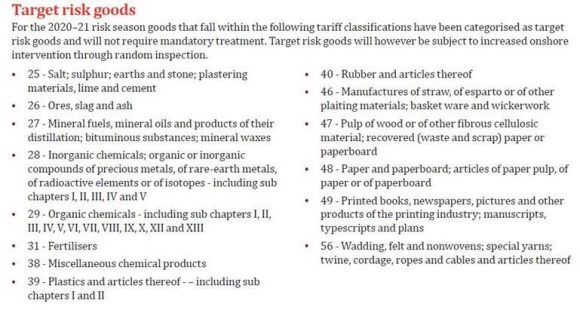NEOLINK Announcement – Brown Marmorated Stink Bug (BMSB) Seasonal Measures Update 2020/21 – from Sep 1st 2020 to 31st of May 2021
Monday 13th of July 2020
Dear Valued Clients,
Recently the Department of Agriculture, Water and the Environment released their updated measures for the commencement of the BMSB Season for 2020/21.
I have attached/provided more detail below in addition to a Key Summary (however I strongly advise all importers to review everything thoroughly):
- BMSB is exotic to Australia and has been identified by the department as a seasonal hitchhiker pest
- Stink bugs have a tendency during late autumn/winter months in the northern hemisphere to stowaway in cargo or on/in containers
- Heightened biosecurity measures as a result are introduced by the department of agriculture requiring containers/cargo to be treated/fumigated before being released into Australia
- Targeted Goods and Countries are provided in detail below, as well as in the attached fact sheets
- There are Three approved treatment options for BMSB – 1. Heat, 2. Methyl Bromide and 3. Sulfuryl Fluoride
- FCL Containerized Cargo Goods can be treated at origin or destination at approved premises by the Department of Agriculture
- For goods to be treated at destination, the department has strict packing guidelines to ensure fumigant can circulate withing the container and there is enough space to access goods if required
- NEOLINK will be working individually with our clients proactively that will be impacted by the BMSB Season and will be taking a customer focused solutions approach
Seasonal Measures for the 2020-21 Brown Stink Bug Risk Season
In response to the rapid expansion of BMSB throughout in particular Europe and North America the Department of Agriculture has retained the same seasonal measures from previous seasons.
For this upcoming season, the below measures apply to:
- Certain goods manufactured in, or shipped from target risk countries and/or
- Vessels that berth at, load or tranship from target risk countries,
From 1st of September 2020 and that arrive in Australia territory by 31st of May 2021 (inclusive)

The Department of agriculture has stated that they will be undertaking random inspections not just for the above targeted countries.
They are also going to be also monitoring “at risk countries” below and conducting random inspections for:
- Emerging Risk – Belarus, Denmark, Ireland, Poland, Sweden, UK, Kazakhstan and Chile
- Lower Risk but Monitored – All other EU Countries, Japan, China, Korea, Taiwan, Argentina, South Africa and Uruguay
Treatment Requirements
- Mandatory offshore treatment – Break Bulk consignments of high risk goods shipped from a high risk country including OT and Flat Rack containers will be required to treat offshore. If any untreated Break Bulk cargo arrives into Australia during the BMSB Season it will be denied discharge and redirected for export upon arrival.
- Mandatory offshore or onshore treatment – treatment of target high risk goods shipped from a high risk country shipped in six hard sided containers will be required during BMSB Season. Goods will need to be treated at approved Department of Agriculture treatment centres either at origin or destination in Australia.
- Fumigation Certificates – NEOLINK have existing relationships both at origin and destination with approved department treatment providers. The majority of our customers arrange their importing with us under FOB/EXW terms and we will be assisting with coordinating treatment and compliance closely with the Department of Agriculture. However, if you are arranging under CIF/CFR Terms we strongly recommend you take control of your freight during this period under FOB/EXW terms and manage the entire process to ensure compliance. We have seen multiple instances last season where goods were treated at non approved facilities or with fraudulent certificates and as a result required retreatment on arrival or in some instances had to be reexported .


If your goods are not classified as “target high risk” or “target risk goods”, BMSB seasonal measures do not apply.
Container Packing Guidelines
key factors that must be considered when determining the suitability of a consignment for treatment include:
- free airspace for the effective distribution of the fumigant/ heat to all surfaces of the goods, and for the appropriate placement of concentration sampling tubes and/or temperature monitoring sensors and fans.
- type of plastic packaging around the goods (commercial or shipping)
- whether shipping packaging present restricts fumigant/heat access to goods
- ability to adjust the spacing of goods and packaging prior to treatment if required and if permitted
- interaction of free airspace and packaging in restricting fumigant/heat access to the goods
- ability to assess the entire consignment/container of goods
It is important that all of the above information is shared with your suppliers to ensure compliance with the loading of your containerized goods. NEOLINK will work closely with our origin offices as always to ensure that we are meeting compliance on all of the above, but in a lot of instances where we are not in control of loading the cargo into the container so we need your suppliers to comply with the packing guidelines in the attached fact sheets.
Onshore vs Offshore Approach
Our recommendation as a business is to not take a one size fits all approach with regards to BMSB season and will take a client focused approach with clear recommendations.
There are a number of factors that NEOLINK and our Customer Operations will be taking into consideration when either recommending your goods for treatment at origin or upon arrival into Australia:
- Urgency of goods
- Cut off times for booked sailing, time available to fumigate and goods readiness
- Lead times or waiting times at fumigation centres at Origin
- Commercials – i.e. pricing at origin vs destination (will vary depending on the port of loading)
- Shippers distance/additional trucking to available fumigation centre at origin
We will run each decision past our clients before fumigating/treating and our recommendation will be dependent on the factors above. BMSB Seasonal Measures not only put a cost implication on importers but also a lot of responsibility and compliance with regards to meeting the requirements of the Department of Agriculture. NEOLINK and our team are here to help you navigate through this season and are happy to provide as much advice as required to any key stakeholders in your businesses.
Best regards,
NEOLINK Marketing Team


